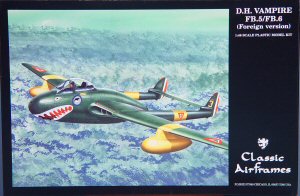
Classic Airframes 1/48 Vampire FB.5/FB.6 Kit First Look
By Michael Benolkin
| Date of Review | May 2005 | Manufacturer | Classic Airframes |
|---|---|---|---|
| Subject | de Havilland Vampire FB.5/FB.6 | Scale | 1/48 |
| Kit Number | 495 | Primary Media | Styrene, Resin |
| Pros | Excellent detailing in the cockpit and wheel wells | Cons | |
| Skill Level | Intermediate | MSRP (USD) | Out of Production |
First Look
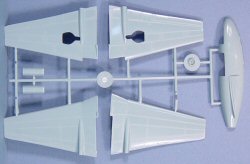 |
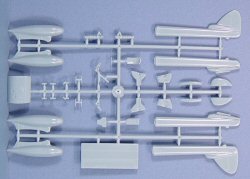 |
 |
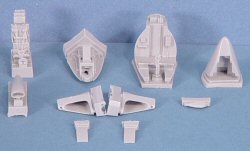 |
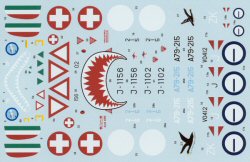 |
 |
The Vampire was the UK's first operational single-engine jet fighter and was the first jet fighter in the world to land on an aircraft carrier. The distinction for the first operational single-engine jet fighter went to the He 162 Volksjager.
The weight penalty for using a twin-boom structure was offset by obtaining the optimum thrust out of the early jet engines by not forcing them to breath down or exhaust out of long fuselage ducts. The overall design is one of simple functionality, with the least amount of weight to carry a pilot, guns, fuel and an engine aloft.
Production of the Vampire extended over 20 years in several countries, with over 5,000 aircraft built. Few jet aircraft can boast of a production run of that size, much less mass production of the UK's first operational jet fighter!
This new series from Classic Airframes isn't the first Vampire to be produced in 1/48 scale (Hobbycraft earned that distinction), but this is certainly the best Vamp (in my opinion) produced in any scale to date.
Molded in Classic Airframes' standard light gray styrene, the kit is presented on two parts trees. Each release from Classic Airframes raises the bar on their injection molding standard as these parts are sharply detailed with crisp panel lines and detailing. No flash is apparent on any of the parts and you can see the simple layout for yourself.
The kit also comes with two sets of resin parts, one with the early mark cockpit (pre-ejection seat version) and the second with the ejection seat. The casting quality of the resin parts is as sharp as the styrene. Both cockpit tubs, for instance, have the control column molded in place. Very impressive casting indeed!
The kit also comes with two sheets of decals to cover the foreign-operated Vampires. Some folks might be confused when the get to the painting and marking instructions as two FB.31s and two FB.6s are represented, though the box says that the FB.5 and FB.6 are the subject of the kit.
Relax, they're both right. The Vampire FB.30 was the designation applied to Australian FB.5s and these were updated to the FB.31 to reflect improvements in the production aircraft and to adopt the RAF's clipped wings. It took me a few seconds of page flipping to realize that in my example, the same two FB.31 profiles were printed on both sides of the Australian sheet. How do you keep an engineer busy? See the other side. How do you keep an engineer busy? See the other side...
Profiles are also provided for a pair of Swiss Air Force FB.6s. Where I get confused is where my example did not include a profile for the Mexican (FAM), the box art and decals definitely cover a Vamp in FAM markings. According to the Crowood Press book covering the Vampire, Mexico only operated ex-Canadian F.3 and ex-RAF T.11 examples. No biggie, many folks are going to like the Swiss sharkmouth on their
I am really impressed with the nice injection molding on this kit, and even more so with the casting of these resin parts! The only real challenge in building this kit will be to get sufficient weight into the nose to allow it to sit properly on the nose gear. I don't see any issues here and only a beautiful rendition of this unique aircraft.
My sincere thanks to Classic Airframes for this review sample!







